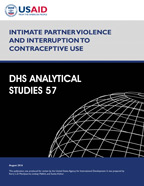- PUBLICATIONS
- JOURNAL ARTICLES
- ACCESS PUBLICATIONS
Publications Summary
- Document Type
- Analytical Studies
- Publication Topic(s)
- Domestic Violence, Family Planning
- Country(s)
- Kenya, Rwanda, Uganda, Zambia, Zimbabwe, Egypt, Jordan, Kyrgyz Republic, Tajikistan, Cambodia, Honduras
- Language
- English
- Recommended Citation
- MacQuarrie, Kerry L.D., Lindsay Mallick, and Sunita Kishor. 2016. Intimate Partner Violence and Interruption to Contraceptive Use. DHS Analytical Studies No. 57. Rockville, Maryland, USA: ICF International.
- Download Citation
- RIS format / Text format / Endnote format
- Publication Date
- August 2016
- Publication ID
- AS57
Download
 Intimate Partner Violence and Interruption to Contraceptive Use (PDF, 2281K)
Intimate Partner Violence and Interruption to Contraceptive Use (PDF, 2281K)
